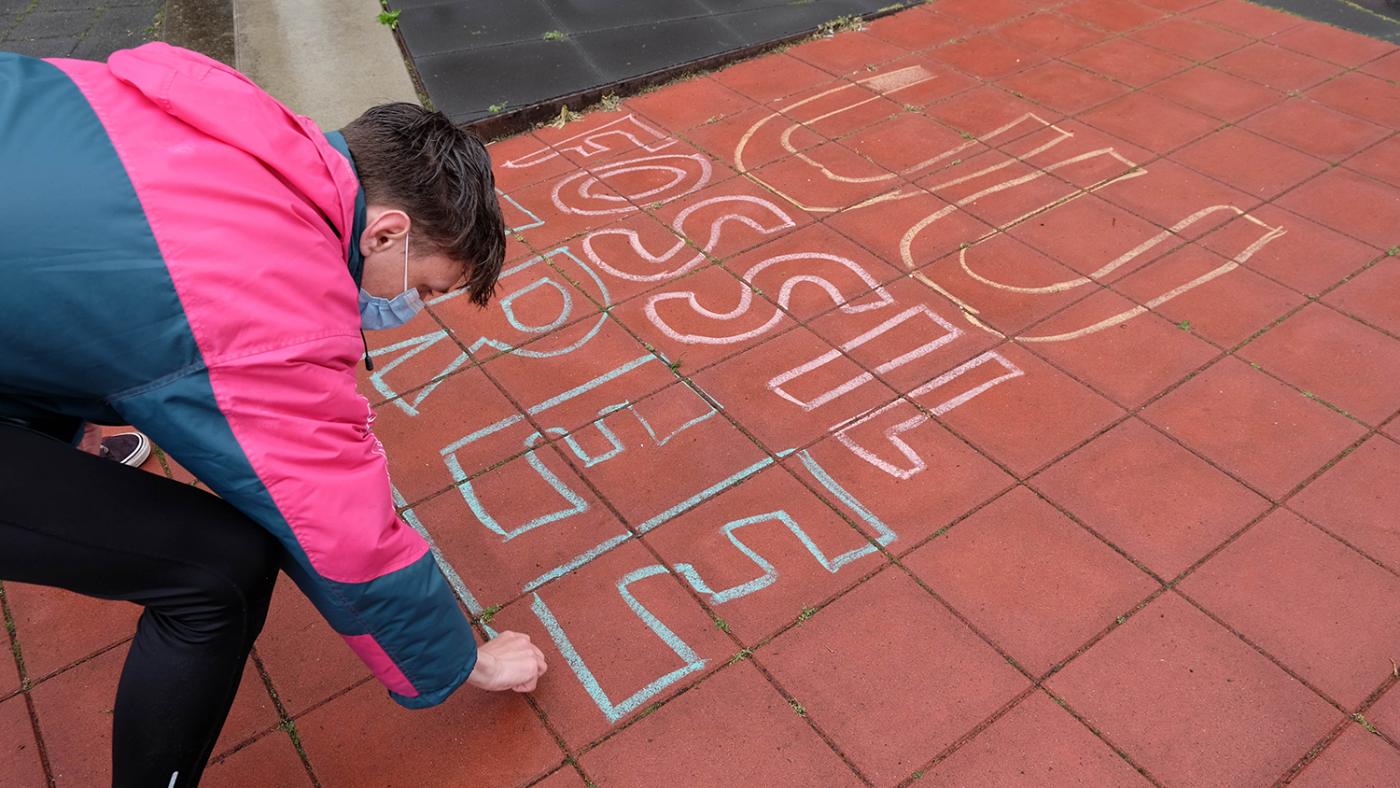Rector Kummeling discusses UU’s ties with Shell
‘Collaborating with Shell is a complicated balancing act’

In the past three months, three major protests took place at the Eindhoven University of Technology, the Erasmus University in Rotterdam and the University of Amsterdam. Activists belonging to organisations such as University Rebellion and End Fossil: Occupy, occupied the universities' buildings to demand the severing of all ties with the fossil fuel industry, even when such collaborations might speed up the energy transition.
In the activists' view, companies likes Shell collaborate with universities to "greenwash" their image. It gives them the appearance of sustainability while their actual contribution to the energy transition remains at a minimum. According to the activists, Shell has reserved only five percent of its budget for "green projects".
It is well known that UU also collaborates with the fossil fuel industry — something that has been questioned for a while. In 2016, the University Council organised a debate about partnerships with controversial companies, Shell among them. That same year, activists protested Shell’s presence at the university's Careers Day with a flashmob, all the rage at the time.
The discussion has only grown these past few years, thanks to more radical organisations such as Extinction Rebellion. On February 2, the biodiversity centre Naturalis, in Leiden, announced the end of its association with Shell. A couple of days later, it was the turn of Erasmus University Rotterdam to acknowledge "the climate and ecological state of emergency" we find ourselves in. They topped it off with with the launch of guidelines for its collaborations with polluting organisations. On February 8, the University of Amsterdam made a public statement saying that it will not enter any research partnerships with the fossil fuel industry from now on.
Many of the protests were aimed specifically at Shell. The Dutch company which is often treated as a kind of pars pro toto of the entire fossil fuel industry. That's why we focused on this company when talking to Rector Henk Kummeling.

UU's Rector Henk Kummeling
What do you think about all the protests going on at other universities?
“Part of me is concerned but I’m also understanding. The issue is very much alive at our own university, there are a lot of people who are engaged with it. I have seen it discussed everywhere around me. I understand that this leads to protests. People want to make their points of view visible.
“An occupation is one of the ways to do that. But for UU it’s more important to actually change things through education and research. That is an important assignment for us, as Anton Pijpers, chair of the Executive Board, said in his speech at the opening of this academic year. One year ago, we also chose the climate crisis to be the theme of the university's anniversary, also known as Dies Natalis.
Suppose that an empty UU building is occupied by activists. Will the Executive Board call the riot squad too?
“Well, that would not be my first reaction. There have been occupations at UU before. When I studied in Nijmegen, I took part in an occupation myself. It is not wrong to make issues visible. But, in the end, the buildings do belong to the university. Calling the police should be the last resort, for when you're really unable to communicate that the building should be vacated through any regular means and the situation becomes unsafe.”
"Shell" has been a hot topic lately. What kind of ties does UU have with the company? There is hardly any specific information about this online.
“Look, if you want to know how we collaborate with the Trimbos Institute, that information is not readily available either. But, based on the behavioural code of scientific integrity, all of our scientists are required to describe whether their research was financed by Shell. They always do that.
“In light of the current discussions, we are planning to give more visibility to our collaborations with certain industries. We want to be transparent about the existing connections and what they entail.
“We do not help Shell drill oil. The research carried out in collaboration or on behalf of certain fossil fuel companies mainly aims to promote the reduction of CO2 emissions and the energy transition. Shell has an infrastructure that is good for us to use. At least, that is what the scientists I have spoken to about this topic say.
“It is true that we could invest more into the energy transition — and we want to do that. That's why we are analysing our partnerships thoroughly. In any case, there are thirteen contracts allowing UU research to be at least partially financed by the fossil fuel industry. Such studies are about the development of biofuels, for instance. But there are more ways of collaborating, which are sometimes indirect. We are looking into how we can make all these projects and ties more transparent buy we need time to do it carefully.”

University Rebellion's chalk action. Photo: DUB
The study association of Geosciences, U.A.V., is sponsored by Shell. That seems like a different sort of collaboration. What do you think about that?
“There is no central oversight for the study associations. I will not monitor the companies with which they collaborate. One of the parts of working in this academic community is taking responsibility.
“But I do think we should ask this association some critical questions. They should think long and hard about this partnership. Do they want to continue to let Shell sponsor them? If a sponsor does not facilitate the energy transition, I think we should be reluctant to collaborate with them.”
Shell has been the subject of heated discussions for a while. Why has it taken until now for the university to take a more proactive stance regarding the transparency of these partnerships?
“Because it is of immediate relevance now. We do not have a tradition of transparency about these kinds of topics. However, we are always part of societal discussions in many areas. It has become very clear now that society expects us to provide this information and we will be doing that. But yes, perhaps we should have thought of that ourselves earlier.”
Do we need Shell for the energy transition?
“Yes, or so scientific experts on this topic tell me. Shell has certain facilities, such as laboratories and reactors, that we don’t have. By collaborating with them, we can use their infrastructure. Moreover, this allows us to execute experiments on a larger scale which enables us to help make the fossil fuel industry more sustainable. That is crucial if we want to achieve the international climate goals.”
Doesn't that make us dependent on Shell?
“No, the research or focus will not be dependent. If that were the case, we would have to quit the partnership immediately. We need them but we won’t surrender to the wishes of the fossil fuel industry. Neither our research questions nor our research methodologies belong to them.
“These past few weeks, we have had a lot of discussions with people from the Faculty of Geosciences to be sure that we are still ‘in charge’ of our own research. Our questions were about whether they were absolutely certain that our activities were right, and about the goals and extent of the collaborations. Based on these discussions, I have concluded that what we are doing does help the energy transition.”
Is just talking to the faculties enough?
“At the moment, I have to trust that I am being told the right information. I won’t create a police state at this university. The deans of the faculties are all on top of it. But we will become more transparent for people outside of the university too.
“It is also important for this not to be the end of the discussion. Many people also consider a collaboration that still serves the energy transition as undesirable, as it would constitute ‘greenwashing’.
“That is why we want to organise debates about this subject as part of the Dies celebrations, where all the opinions about this subject can be truly heard. It is not useful to hunker down and demonise each other. The university should be a place of open debate based on arguments. The climate crisis is a huge problem. The most important question of our times is how we, as a university, can contribute as much as possible to solving this problem. We will need people from all kinds of professional fields for that.”
Is Shell ‘greenwashing’ itself through its collaboration with UU?
“Shell wants to exude a green image through its marketing campaigns without drawing attention to their polluting activities, that much seems clear to me. I am not in charge of that but we should be very critical of their practices. However, I have not seen Shell say: “we are continuing to pump oil because the university has given us permission”. If Shell was using UU to legitimise its polluting activities, we would have to have a serious talk with them. But I have not received any indication that this is happening now.
“I do think that the university should continue to stress that Shell should use a larger part of its budget to facilitate the energy transition. It would be noteworthy if we were satisfied with Shell investing only a couple of million euros in wind energy, as a manner of speaking, while their research budget is much bigger.”
Are we able to insist on such things within our current collaboration?
“I am not present at day-to-day meetings but I think our researchers are critical of Shell. During the Dies debates, we also want to ask our scientists: how can you be critical of your own contractor? And what role does the Executive Board have in this?”
Is it possible that the ties to Shell will be severed completely someday?
“Definitely, but that goes for every company we collaborate with. Look at the tobacco industry — we cannot legitimise a collaboration with that industry anymore. There is no way it would lead to sensible things.”
Why does that apply to the tobacco industry, but not the fossil fuel industry?
“Because we won’t be able to say goodbye to fossil fuels overnight. As a society, I think we will need the fossil fuel industry for the energy transition due to its size and know-how.
“We truly think that big fossil fuel companies are concerned about this and want to be involved, although perhaps not to the extent we would like them to be. But we think there are still opportunities to collaborate. I still see the light at the end of the tunnel.
“However, we do need to develop standards and concrete goals. If the university notices that the energy transition is taking too long and the industry is not assisting us enough, severing ties remains an option. It is clear to me that if the percentage of Shell’s budget for the energy transition is not increased, we should stop working together.
“It is all part of a complicated balancing act. We have to both help and convince companies like Shell. For the foreseeable future, my conviction is that collaborating is the quickest road to the energy transition. But we will debate this topic in the coming months, with both scientists that collaborate with the fossil fuel industry and with students and employees who strongly oppose those collaborations.”
But are we still seeing progress?
“Yes, for now. We expect that the energy transition will accelerate considerably due to the current climate crisis. But if we find that the fossil fuel industry opposes those developments, or that they refuse to make any big strides, we will stop providing them with input.”
You just said that we need Shell’s facilities for the energy transition. How can we ever sever our ties to Shell if that remains the case?
“Yes, right now we do need Shell. But if that collaboration is not serving us anymore, then we will work with other institutes, such as the Dutch Research Council (NWO) and the government to search for alternatives and new possibilities on a national level.”
Debate series about the collaborations with the fossil fuel industry
The Executive Board and the University Council will organise debates about the conditions under which the university should collaborate with the fossil fuel industry. The first one will take place in March.
The debating method that will be used is the one used by Deep Democracy. The purpose is to shed a light on different insights coming from different disciplines within the academic community, varying from the vision of activist students and employees that diametrically oppose any sort of collaboration to the thoughts of scientists working with the fossil fuel industry right now.
The takeaways should be highlighted to as many students and employees as possible. The same goes for the actions the Executive Board and the co-determination bodies plan to take based on the discussions.
Are you interested in participating? Or do you want to be notified of any news regarding the debate? Send an email to: secretariaat.cvb@uu.nl